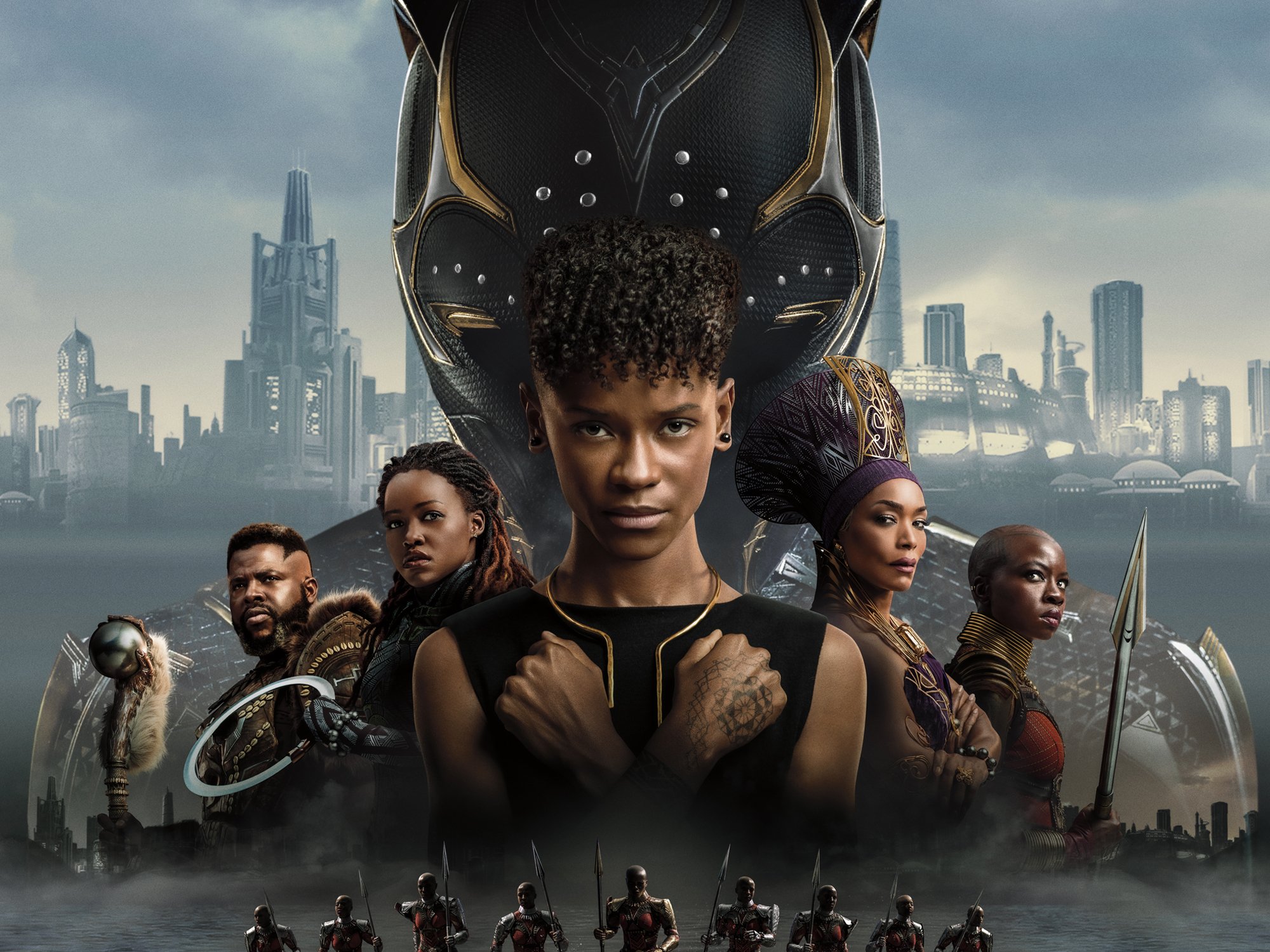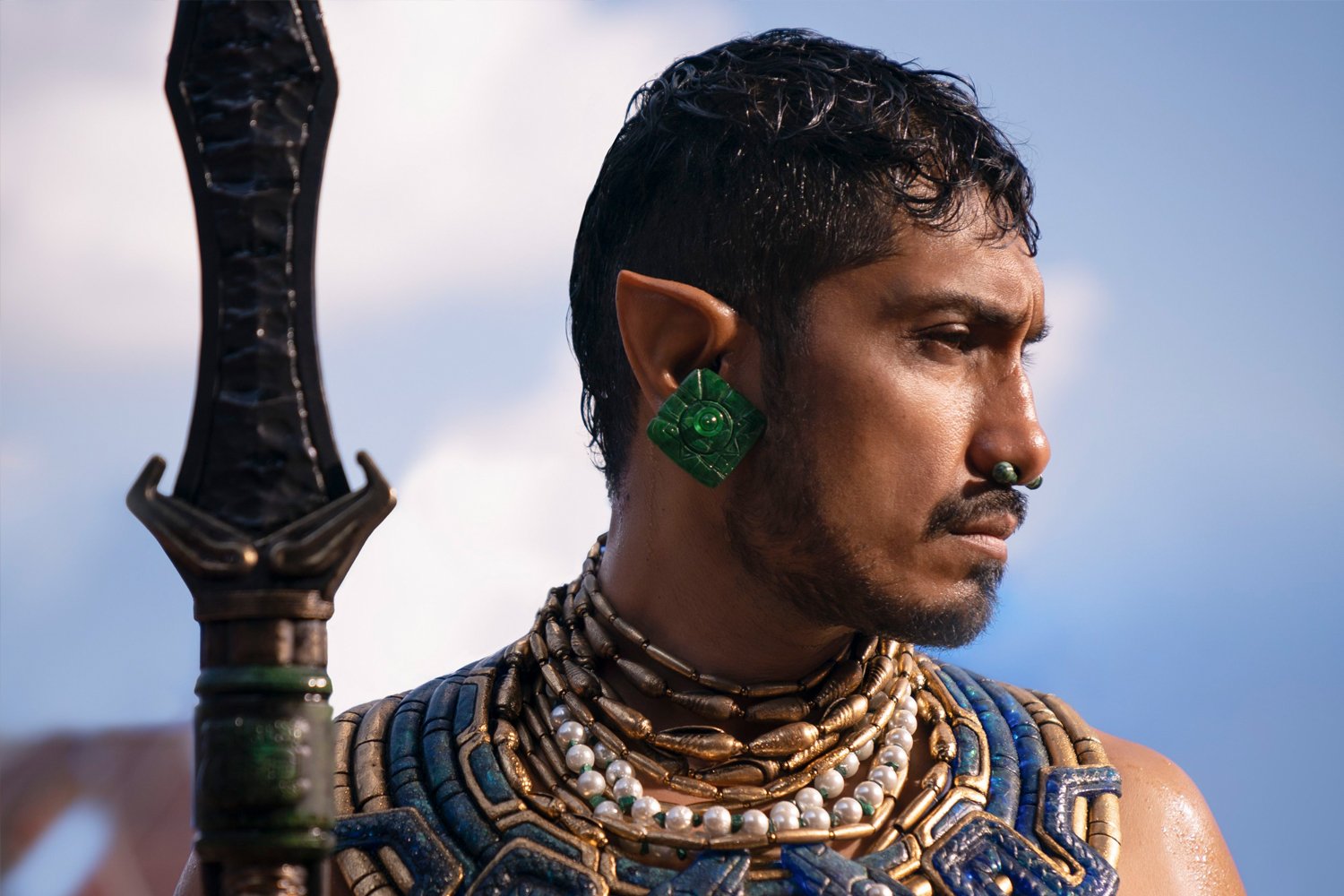Film Review — Black Panther: Wakanda Forever
BLACK PANTHER: WAKANDA FOREVER IS A SHAGGY, HEARTFELT ENDCAP TO MARVEL’S PHASE FOUR
Ryan Coogler pulls it out of the fire with the overstuffed and gorgeously wrenching Black Panther: Wakanda Forever. A powerful tribute to the late Chadwick Boseman combined with Marvel myth-making at its most thoughtful, the film admirably attempts to fill an irreparable void left by its star’s untimely passing. Wakanda Forever strikes an often delicate, occassionally clumsy balance between an all-caps comic book movie and an intimate tour through the stages of grief. Letitia Wright, Angela Bassett, and Tenoch Huerta are the most formidable trifecta Marvel has seen in years. Minor spoilers ahead…
Chadwick Boseman passed away two years ago this past August. Leaving behind a storied career that spanned from TV procedurals all the way to his Oscar-nominated turn in 2020’s Ma Rainey’s Black Bottom, Boseman was a superstar taken from us too soon. But across all his acclaimed performances, none came close to the seismic cultural impact of his role as King T’Challa in Marvel’s Black Panther. Nothing short of a game-changer, Black Panther - with its jubilant celebration of Blackness in front and behind the camera - found Boseman as the charismatic center of not only his own film, but an entire cinematic universe. So when his sudden passing from colon cancer, a diagnosis kept completely private, sent shockwaves through the industry, it ripped a potentially catastrophic void in Wakanda Forever, the long-gestating sequel to director Ryan Coogler’s massively successful MCU debut. With a near-completed script upended by its star’s tragic death, Coogler and co-writer Joe Robert Cole scrambled to reconfigure the entire film to ask a singular question: Can there be another Black Panther?
Wakanda Forever opens with the devastating death of a king. T’Challa - neither seen nor heard - lies on his deathbed as his genius sister, Shuri (Letitia Wright), gathers all the resources of the most advanced nation on the planet to engineer a cure for her brother’s unnamed illness. But the end is as mysterious as it is merciless and swift: The king is soon dead, and Shuri, her queen mother Ramonda (Angela Bassett at her most regal and commanding), and the rest of Wakanda are left to mourn their lost superhero regent. From the film’s opening salvo, filled with funereal celebration and graceful mourning, it’s clear that the ineffable chasm left by Boseman’s - and T’Challa’s - death would be handled by Ryan Coogler with tact and intelligence rather than ghoulish exploitation, sidestepping Disney’s increasingly cavalier willingness to manipulate, de-age, and revive. Folding real-life tragedy into the fabric of Wakanda Forever’s sprawling superheroics and tour of grief, Coogler strikes an affecting balance between spectacle and elegy.
“From the film’s opening salvo…it’s clear that the ineffable chasm left by Boseman’s - and T’Challa’s - death would be handled by Ryan Coogler with tact and intelligence.”
Continuing the threads established in 2018’s Black Panther, which saw T’Challa open his nation to outsiders for the first time, Wakanda Forever follows up with the cost of doing global business. Beset on all sides in the United Nations by an international thirst for vibranium - the miracle metal that gives Wakanda its technological supremacy - Queen Ramonda finds herself defending her country on multiple fronts: against diplomats chastising the nation for its vaulted protection of its precious ore, and against covert acts of piracy looking to plunder the metal from Wakandan vessels. The escalating contention over resources is further complicated when an American operation incurs the wrath of a mysterious new superpower, an underwater kingdom - also powered by vibranium - hell bent on seeking retribution upon the greedy denizens of the surface world. Their leader? The winged-footed mutant Namor (Tenoch Huerta), oozing a noble, menacing extension of Killmonger’s extremist anti-colonialism. Soon enough, Wakanda is delivered an ultimatum from Namor’s Talokan empire: ally with the underwater nation, or perish with the surface dwellers.
Wakanda Forever shines most brightly when it focuses on its beaming triumvirate of Letitia Wright, Angela Bassett, and Hollywood newcomer Tenoch Huerta. The vibrant, violent clash between parallel civilizations - the Afrofuturist Wakanda and its underwater Mesoamerican counterpart Talokan - is beautifully wrought and teeming with questions of allyship and spinous racial tensions, which eventually collide with Shuri’s own approach to her grief. Huerta’s Namor might lack the galvanizing venom and clarity of purpose behind Black Panther’s Killmonger (Wakanda Forever’s lone, jaw-dropping cameo is a sore reminder of this), but his hair-trigger toggle between noble ruler and ruthless firebrand is just as captivating. Laced with palpable heartbreak mined from real-life tragedy, Wakanda Forever’s central tapestry is a rich one, tackling the dormant rage in tragedy and sorrow with a deftness rarely afforded to comic book films. And it’s all the better soaked in Ruth E. Carter’s fabulous superhero couture and Hannah Beachler’s textured production design, holdovers from Black Panther cranking up the sumptuousness to even more eye-popping levels.
“Wakanda Forever shines most brightly when it focuses on its beaming triumvirate of Letitia Wright, Angela Bassett, and newcomer Tenoch Huerta.”
The battle lines between Wakanda and Talokan are so well-drawn, teetering deliciously between enmity and mutual admiration, that it’s almost a shame it has to share an already overlong 2 hour 40 minute runtime with mandated Marvel ‘verse-building. A States-bound excursion that introduces genius tinkerer Riri “Ironheart” Williams (Dominique Thorne, warming up for her own Disney Plus series) is a pleasant distraction that predictably veers into afterthought, but it’s Martin Freeman’s momentum-deferring Everett Ross who hangs like an albatross around Wakanda Forever’s neck, incessantly beholden to hint at the growing role for the annoyingly miscast Julia Louis-Dreyfus as Valentina Allegra de Fontaine. It’s a good thing, however, that the film continues to extrapolate Black Panther’s fierce, supporting cadre of Wakandan women: Dora Milaje heavy Okoye (Danai Gurira) and super-spy Nakia (Lupito N’yongo) both make welcome returns, each given weighty subplots that either further the increasingly brutal fisticuffs or deepen the tugs upon the heartstrings.
Can there be another Black Panther? The half-answer is in Wakanda Forever’s moving metatext, leaning into its own Chadwick Boseman-sized void to highlight the late actor’s inextricability from his most famous role, and to perhaps find a new way forward while honoring what came before. In the end, what is for certain is that after an entire uneven phase of multiverses, Celestials, and screaming goats, it’s Ryan Coogler that once again finds the emotional center for the Marvel universe. At over a decade old and almost 30 movies in, the possibility of a lean movie within the MCU likely no longer exists - its ingrained behaviors to perpetually expand and service have grown too profitable to ever be unlearned; however, Wakanda Forever finds the big, artful swing within the rigid machinery of corporate superheroics. It’s sprawling, shaggy, and overstuffed, but leave it to Ryan Coogler to pull off the miraculous feat of deftly threading real-life tragedy with cultural acuity and an affecting superhero story on grief, loss, and the cycle of violence.













